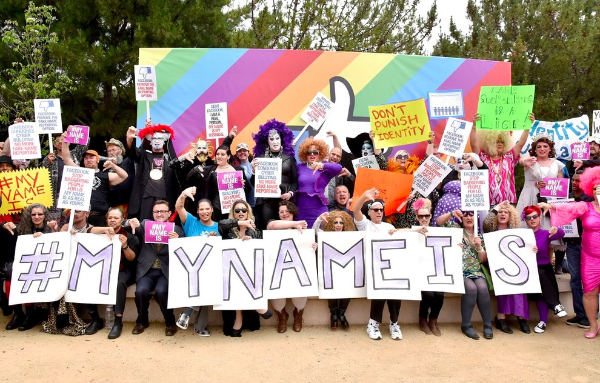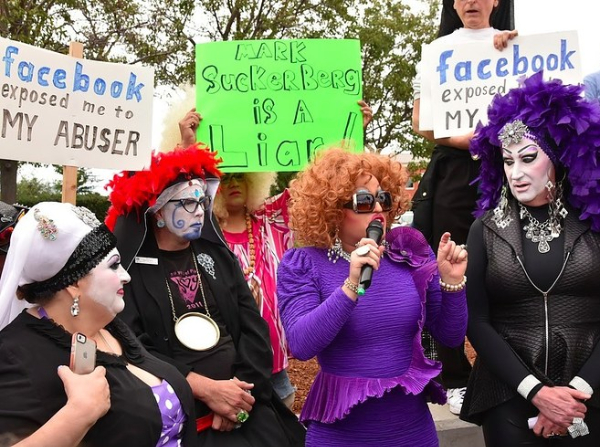Facebook Won't Back Down on Real-Name Policy
A protest Monday at Facebook HQ made the company change a few things about its authentic name policy, but that's about it.

What's in a name? A lot, it seems. Facebook's newly reinforced real-name policy is under attack from people who want the ability to change their profile names on Facebook to the names they actually associate with. Yet June is the National Internet Safety Month in the U.S., and safety is a top concern for Facebook users along with individual rights.
On Monday (June 1), hundreds of drag performers, LGBTQ community members, Native Americans and sexual-abuse survivors protested with their thumbs down as part of the #MyNameIs Campaign outside of Facebook headquarters in Menlo Park, California. To reinforce their point, they demonstrated in front of the rainbow-colored thumbs-up sign that Facebook itself had put up for June, commonly acknowledged as Pride Month.

"Facebook has yet to offer any real proof from your own analytics or academic research that this policy offers any true protection," Lil Miss Hot Mess, a drag queen who helped run the #MyNameIs protest, wroteMonday on Facebook as a comment to Facebook's response to the protest. "Indeed, in your hypothetical scenarios, it would be quite easy for someone to create a fake account called 'Bill Smith' to harass or bully these users."
The #MyNameIs campaigners have been at it since October, and in response, Facebook has made a few changes to its policy. Still, the social giant is standing by its decree that members should use their real names.
If you have a Facebook account, then you know that the company requires you sign up with a name you use in real life. This has been Facebook's policy since the beginning, purposefully distinguishing themselves from other social networks. "That way," Facebook writes on its Account Settings page, "you always know who you're connecting with."
Facebook also claims that it created its name policy to protect users from abusive online trolls and other forms of online harassment.
"When people use their authentic names on Facebook, they are more accountable for what they say," wrote Justin Osofsky, Facebook vice president of global operations, and Monika Bickert, Facebook head of global product policy, on a Facebook post Monday responding to the protest. "People can be assured that they're really connecting with their loved ones, and no-one can hide behind an anonymous name to bully, taunt or say insensitive or inappropriate things."
Sign up to get the BEST of Tom's Guide direct to your inbox.
Get instant access to breaking news, the hottest reviews, great deals and helpful tips.
But, the #MyNameIs Campaign says the policy discriminates against people who use pseudonyms. Drag queens and sex workers show their own identities through their names, and sex abuse survivors have them for safety measures.
In one concession, Facebook has decided to give members access to their accounts while the company verifies their names. Once a page is flagged as possibly being pseudonymous, users have seven days to show verification for the names being used. The company has also clarified that the name does not have to be a legal one, but merely an "authentic" one. In other words, the name has to be one used in real life but does not have to be a legal one.
Facebook also expanded the list of documents acceptable to verify names to include library cards, magazine subscriptions or pieces of mail. A new option that Facebook has developed in the last nine months allows a person to verify their name with non-legal documents that do not need to include a picture or a date of birth, but then still have to provide a government ID that includes a date of birth or photo that matches the information on that person's profile.
It's not clear that these concessions will calm the protestors down, as there are still reports of cases of Facebook closing accounts because of improper names.
MORE: 7 Ways to Lock Down Your Online Privacy
Facebook may have another incentive for keeping accounts "authentic." In August 2012, Facebook’s share prices were cut in half when there was concern for shareholders that Facebook wasn't increasing its mobile revenue. What added to the concern was Facebook's first quarterly report to US financial regulators, which showed thatmore than 83 million accounts were fake. The company's stock prices were set at $38 when the IPO debuted in May 2012, but dipped below $20 by the end of August. Today, the company is going strong with its stock set at $82.21.

Facebook's real-name policy is at odds with those of many other social media networks, such as Twitter, Pinterest and Facebook's own Instagram. Google+ got rid of its own real-name policy in July 2014 after months of negative user feedback.
Rival social site Ello deliberately does not have a real-name policy, nor does it place ads on pages. Kyler Turnbull, spokesman for Ello, says that Facebook's authenticity is a scam. "Real names are not really about authenticity. They're about collecting data about you and selling it to data aggregators and advertisers," he said.
Facebook does indeed collect data on its users and uses it for a variety of reasons, which it explains in its data policy. Facebook does give users the ability to control the ads they see, as well as the option to opt out of Facebook or other companies collecting or using information on them they receive from websites, devices or apps. Facebook is required to do this, as per the Digital Advertising Alliance in the USA principles.
Nate Cardozo, an attorney at the Electronic Frontier Foundation in San Francisco, believes Facebook should drop its policy because many people could "face real-world harm" such as someone fleeing from an abusive relationship.
"Facebook already has a significant problem with trolls and fake accounts," Cardozo said. Concerning Facebook's real name policy, he believes the negative affects trump any positive ones. "I would encourage them to take a closer look," he said.
- Should You Trust Facebook with Your Anonymity?
- 15 Best iPhone Apps You're Not Using
- Mobile Security Guide: Everything You Need to Know
Ilyse Liffreing is an intern at Tom’s Guide. She will be receiving her MA from NYU. You can follow Ilyse on Twitter @IlyseLiffreing or on Facebook.

